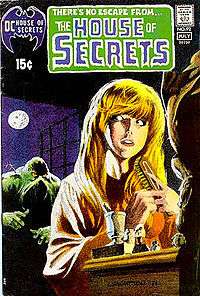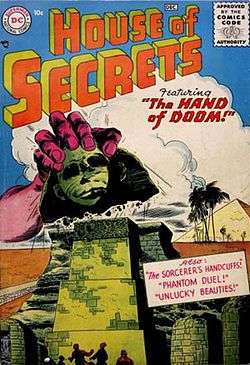House of Secrets (DC Comics)
| House of Secrets | |
|---|---|
|
Cover of House of Secrets #1 (November–December 1956). Art by Ruben Moreira. | |
| Publication information | |
| Publisher | DC Comics |
| Schedule | monthly and bi-monthly (varied) |
| Format | Ongoing series |
| Genre |
Horror Fantasy |
| Publication date |
List
|
| Number of issues |
List
|
| Creative team | |
| Writer(s) | |
| Penciller(s) |
List
|
| Inker(s) |
List
|
The House of Secrets is the name of several mystery, fantasy, and horror anthology comic book series published by DC Comics. It is notable for being the title that introduced the character Swamp Thing. It had a companion series titled House of Mystery.
Publication history
First series
The original Silver Age series ran 80 issues, from November/December 1956[1] to September/October 1966.[2] In addition to short, "one-off" stories, several issues featured the adventures of modern-dress sorcerer Mark Merlin who first appeared in issue #23 (August 1959). The dual-personality super villain Eclipso ("Hero and Villain in One Man!") was created by Bob Haney and Lee Elias and was introduced in issue #61 (August 1963)[3][4] and continued to the series' end. Prince Ra-Man the Mind-Master bowed in #73 (July–August 1965) and was a Doctor Strange-style "replacement" for Mark Merlin.[5][6] Prince Ra-Man twice battled Eclipso.[5][7][8] The "Prince Ra-Man" feature ended in House of Secrets #80 (September–October 1966), the final issue of the series.[9] Other, lesser continuing features included "Peter Puptent, Explorer"; "Dolly and the Professor"; "Doctor Rocket"; and "Moolah the Mystic".
Revival (second run)

The series was revived three years later with a definite article as The House of Secrets, beginning with issue #81 (Aug.–Sept. 1969). Now its horror and suspense tales were introduced by a host named Abel,[10] who would also host the satirical comic Plop!. His brother Cain hosted House of Mystery. Swamp Thing first appeared in House of Secrets #92 (July 1971) in a stand-alone horror story set in the early 20th century written by Len Wein and drawn by Bernie Wrightson.[11] The woman appearing on the cover of this issue was modeled after future comics writer Louise Simonson.[12] The Patchwork Man, a character from the Swamp Thing ongoing series, was to have become an ongoing feature in the series but only appeared in one issue.[13][14]
The revival of House of Secrets, sporting many covers by Neal Adams, Bernie Wrightson, and Michael Kaluta, ran through issue #154 (Nov. 1978), with six months passing between #140 (February–March 1976) and #141 (August–September 1976). It was then 'merged' into The Unexpected with issue #189,[15] through issue #199. The series was 68 ad-free pages, allowing all three portions to be full-length issues.
The House of Secrets also came to be the name of the actual edifice in which Abel lives. Writer Mike Friedrich and artist Jerry Grandenetti introduced the house and explained its origins. The Sandman series revealed it exists both in the real world of the DC Universe and in the Dreaming, as a repository for secrets of all kinds.
The building itself was constructed for a Senator Sanderson using only materials from Kentucky, and went under the enchantment that only pure-blood Kentuckians would be able to live there. Later, Sanderson's wife went insane in the upper floors, leading the Senator to sell the house. The next four owners, none of them pure Kentuckians, found themselves driven away for various reasons. The following owner attempted to move the home from its original location, but the house tore itself free from its trailer, ran its owner over a cliff to his death, and settled less than 200 yards from the Kentucky state line in a graveyard. Whether by fate or some mystical alignment, the companion House of Mystery stands at the other end of the graveyard. Shortly after this, Abel was driven to the house and entrusted as its caretaker by a man who revealed himself to be an aspect of the House's existence, but making vague references to an employer. Abel was showing living in the House of Mystery in the quarterly DC Special #4, published one month earlier (July–Sept. 1969).
The character of Abel would later, in the 1980s and 1990s, become a recurring character in The Sandman and related series such as The Dreaming.
Second series
DC's Vertigo imprint revived the name House of Secrets as a new title and concept. Here the House of Secrets was a mobile manor, appearing in different places. The building itself is haunted by the Juris, a group of ghosts who summon those with secrets in order to judge them and pass sentence. To the Juris, all offenses carry the same weight, from rape and murder to simply lying at a crucial moment. A runaway named Rain Harper stumbled upon the House of Secrets and took up a position as an unwilling witness to the Juris trials, validating the judgments and either condemning the tried souls to imprisonment in the basement, or setting them free to live their life purged of their secret.
Starting fresh with a new #1 (October 1996), this series ran 25 issues, plus a two-part House of Secrets: Facade special. This House of Secrets series was creator-owned except for its title which was "licensed" by DC to the series' creators. The letters column in issue #6 indicates that they could not, for legal reasons, include Cain and Abel in the stories. This series was used for the framing story in the first Vertigo Winter's Edge special, featuring Rain happening upon an art gallery in the house whose paintings allow her to see stories from The Sandman, The Dreaming, Hellblazer, The Invisibles, The Books of Magic, The Minx, Sandman Mystery Theatre and Nevada.
Secret Six headquarters
In the mid-2000s, the Secret Six made their headquarters in the House of Secrets. Scandal stated in issue five of Villains United that the House would not show up on technological scans or mystical surveillance. She also said that Mockingbird claimed the House was a "house of victims."
In other media
The House of Secrets appeared in the Young Justice episode "Secrets". In the series it was depicted as a magic shop across the street from the house of Greta and Billy Hayes.[16]
Collected editions
- The Jack Kirby Omnibus includes stories from House of Secrets #3–4, 8, and 12, 304 pages, August 2011, ISBN 1-4012-3107-1
- Showcase Presents: Eclipso collects Eclipso stories from House of Secrets #61–80, 296 pages, August 2009, ISBN 1-4012-2315-X, 2009-08
- Showcase Presents: House of Secrets
- Volume 1 collects House of Secrets #81–98, 544 pages, August 2008, ISBN 978-1-4012-1818-8
- Volume 2 collects House of Secrets #99–119, 496 pages, October 2009, ISBN 1-4012-2523-3
- The Steve Ditko Omnibus Volume 1 includes House of Secrets #139: "The Devil's Daughter" and House of Secrets #148: "Sorcerer's Apprentice" both by Jack Oleck and Steve Ditko, 480 pages, September 2011, ISBN 1-4012-3111-X
- House of Secrets Omnibus collects House of Secrets vol. 2 #1–25, 752 pages, April 2013, ISBN 978-1-4012-3673-1
References
- ↑ Irvine, Alex; Dolan, Hannah, ed. (2010). "1950s". DC Comics Year By Year A Visual Chronicle. London, United Kingdom: Dorling Kindersley. p. 81. ISBN 978-0-7566-6742-9.
The mystery-suspense anthology series House of Secrets began the eighty-issue run of its first incarnation in December.
- ↑ House of Secrets at the Grand Comics Database
- ↑ Wallace, Dan (2008). "Eclipso". In Dougall, Alastair. The DC Comics Encyclopedia. London, United Kingdom: Dorling Kindersley. p. 112. ISBN 0-7566-4119-5.
- ↑ McAvennie, Michael "1960s" in Dolan, p. 109: "In August's House of Secrets #61, writer Bob Haney and artist Lee Elias used a black diamond to transform Dr. Bruce Gordon into Eclipso."
- 1 2 Markstein, Don (2010). "Prince Ra-Man, Mind Master". Don Markstein's Toonopedia. Archived from the original on October 11, 2012. Retrieved October 11, 2012.
The character came to be when powers within the company apparently decided Mark Merlin...wasn't working. Superheroes were what was selling, so that's what Mark needed to be replaced with. But instead of simply not using Mark Merlin anymore, and introducing something new where he'd formerly been, they attempted to retain whatever fans he may or may not have had by linking him to the new guy.
- ↑ Haney, Bob (w), Baily, Bernard (p), Baily, Bernard (i). "The Death of Mark Merlin" House of Secrets 73 (July–August 1965)
- ↑ Haney, Bob (w), Sparling, Jack; Baily, Bernard (p), Sparling, Jack; Baily, Bernard (i). "Helio, the Sun Demon!" House of Secrets 76 (January–February 1966)
- ↑ Haney, Bob (w), Sparling, Jack; Baily, Bernard (p), Sparling, Jack; Baily, Bernard (i). "The Master of Yesterday and Tomorrow!" House of Secrets 79 (July–August 1966)
- ↑ Haney, Bob (w), Baily, Bernard (p), Baily, Bernard (i). "The Death of the Six-Sided Sun" House of Secrets 80 (September–October 1966)
- ↑ McAvennie "1960s" in Dolan, p. 134: "Abel never earned any respect from his brother...Yet it didn't stop him from reopening House of Secrets with issue #81, following the series' three-year hiatus."
- ↑ McAvennie "1970s" in Dolan, p. 146: "'Swamp Thing' was the name of Len Wein and Bernie Wrightson's turn-of-the-century tale, and its popularity with readers led a modernized version of the character into his own series a year later."
- ↑ Levitz, Paul (2010). 75 Years of DC Comics The Art of Modern Mythmaking. Cologne, Germany: Taschen. p. 481. ISBN 978-3-8365-1981-6.
When Swamp Thing debuted in this issue of House of Secrets as a "one-shot", no one could have known it would lead to an enduring hit franchise, least of all its cover model, future comics writer Louise Simonson.
- ↑ Conway, Gerry (w), Redondo, Nestor (p), Redondo, Nestor (i). "Reprise: The Patchwork Man" House of Secrets 140 (February–March 1976)
- ↑ Kingman, Jim (January 26, 2010). "DC Shake-Up (and fallout): The Patchwork Man". Comics Bulletin. Archived from the original on September 24, 2015.
Despite the potential, the great artwork, the intriguing cast, and the interesting plot points, House of Secrets was suddenly 'canceled' after issue #140 – The Patchwork Man’s first and only appearance in what was meant to be an ongoing run in the series.
- ↑ Wells, John (October 24, 1997), "'Lost' DC: The DC Implosion", Comics Buyer's Guide, Iola, Wisconsin (1249), p. 132,
Following its cancellation with #154, House of Secrets was merged with The Witching Hour and Doorway to Nightmare in The Unexpected, which was expanded to Dollar Comic size to accommodate the changes.
- ↑ David, Peter (writer); Oliva, Jay (director) (November 18, 2011). "Secrets". Young Justice. Season 1. Episode 18. Cartoon Network.
External links
| Wikimedia Commons has media related to House of Secrets (DC Comics). |
- House of Secrets at the Comic Book DB
- House of Secrets (Vertigo) at the Comic Book DB
- House of Secrets at Cover Browser
- House of Secrets and House of Secrets (Vertigo) at Mike's Amazing World of Comics
